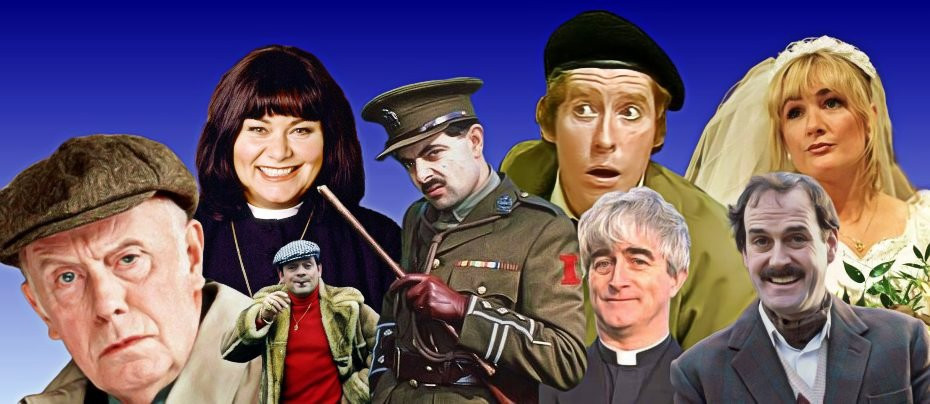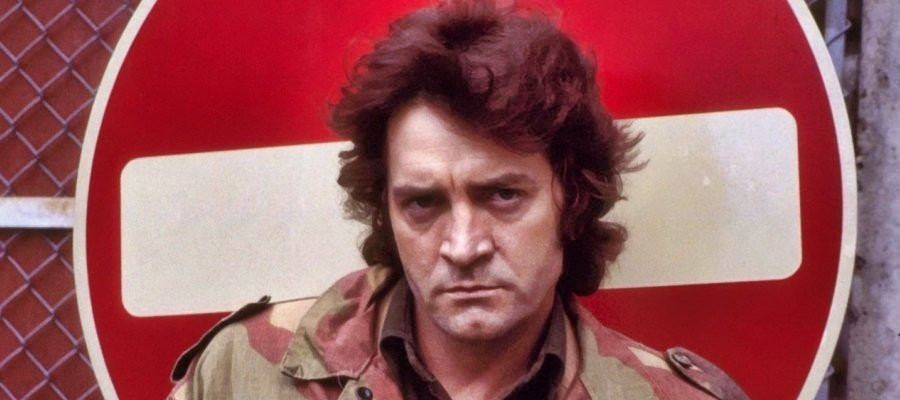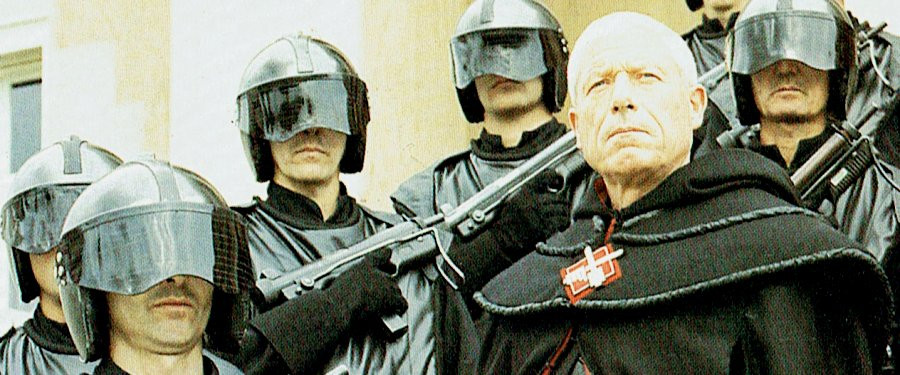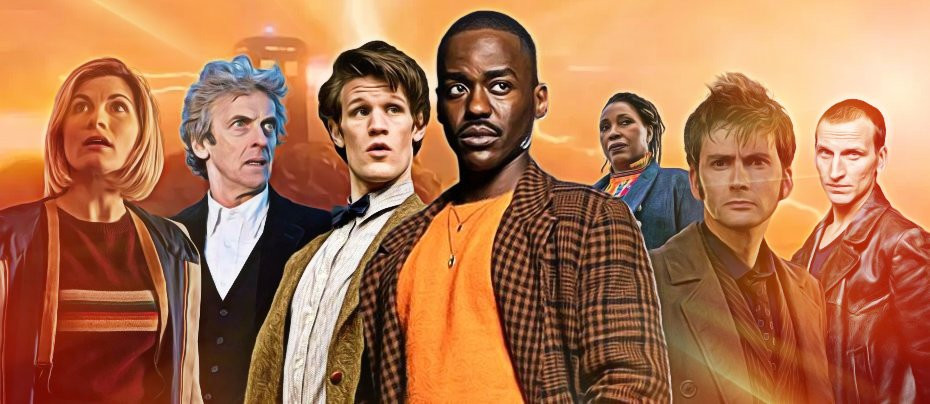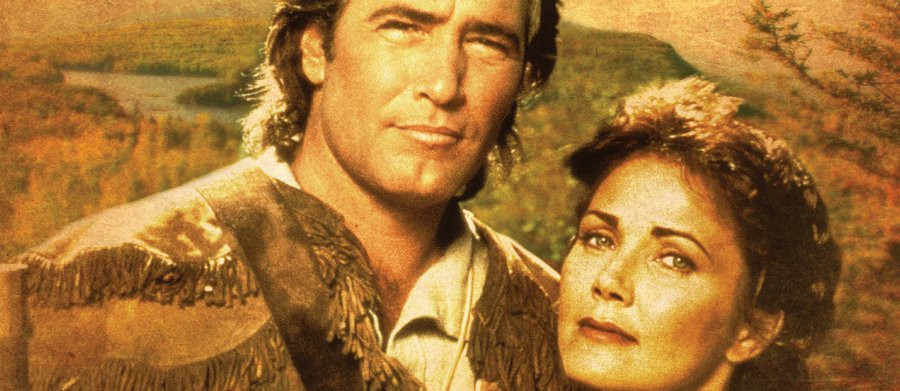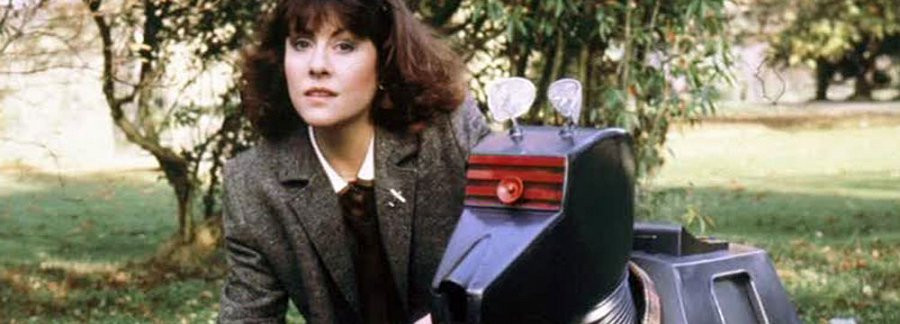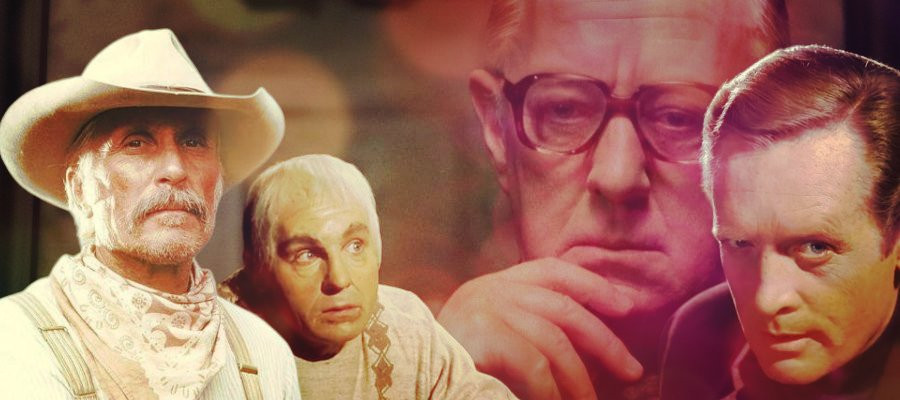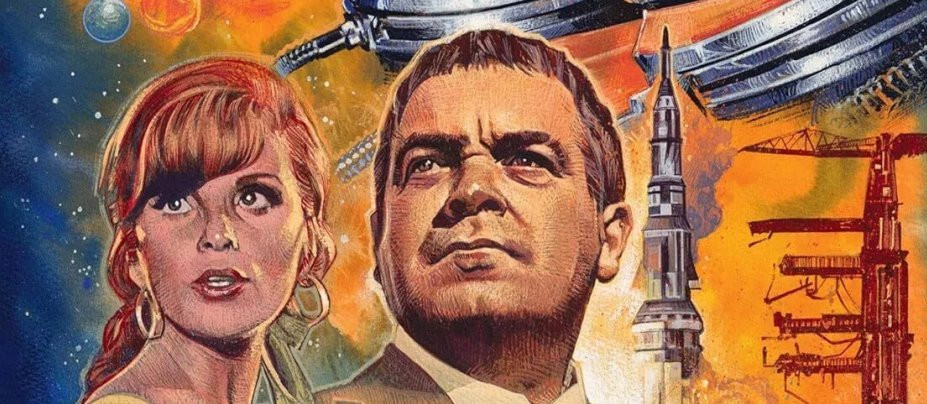The Key to Time – Part Two
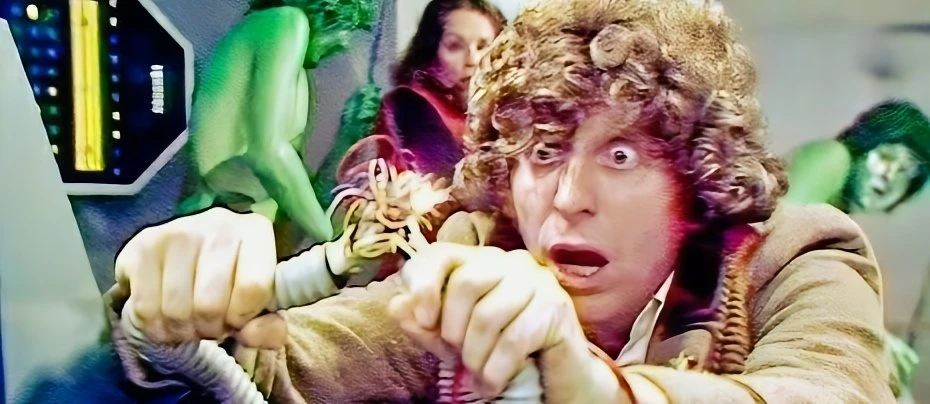
Review by Daniel Tessier
For the first three episodes review of season 16 click here
Doctor Who's sixteenth season, known by the umbrella title The Key to Time, was comprised of six serials tied together by an overarching story: the quest for the six segments of the Key on the behest of the White Guardian (Cyril Luckham). The season saw the Doctor (Tom Baker) and his new assistant, the Time Lady Romana (Mary Tamm) travel to a different planet in each serial, searching for a segment which could be disguised as absolutely anything. Fortunately, they have a gizmo called a tracer, which tells them the space/time location of each piece, and acts as a sort of divining rod when they're nearby, because the season needs to last twenty-six weeks, not the rest of time.
After writing the script for the third serial, The Stones of Blood, David Fisher was called upon to provide another script in short order when it became clear that the slot's commissioned writer, Ted Lewis, would be unable to complete his due to personal difficulties. Fisher created a loving pastiche of Anthony Hope's 1894 novel The Prisoner of Zenda, the classic tale of doubles and political intrigue. The much-filmed story had been paid homage to many times before; even so, the BBC vetoed the working titles The Androids of Zenda and The Prisons of Zend to avoid potential legal difficulties.
Fisher delivered a swashbuckling adventure, an underrated story often overlooked among more fondly remembered serials of the period. The Androids of Tara blends sci-fi with cod-European royal politicking. The planet Tara, or what little we see of it, is a picturesque kingdom were the aristocracy fight with electrified swords but have no knowledge of technical matters. That's left to the peasant class, among whom are some of the finest android makers of the galaxy. It doesn't make much sense if you think about it too hard, but it doesn't matter; it's a lovely conceit. Fisher had wanted Tara to be more fantastical, with unicorns and mythical beasts (robotic or otherwise), but the budget couldn't stretch to that. What he got was a mercifully brief appearance by a terribly unconvincing bear-like creature. At least K-9 fits in nicely on Tara.
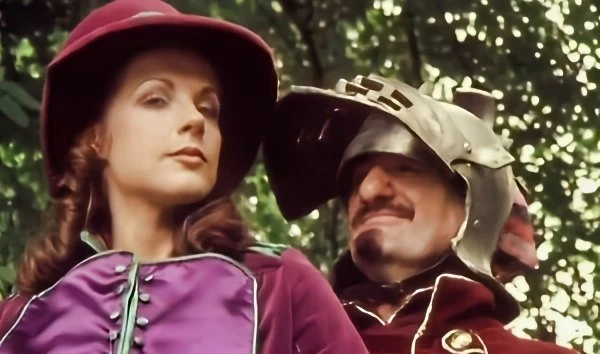
By this stage it's clear that the quest for the Key segments is becoming a bit of a chore for the writers, and Fisher clearly can't be bothered wasting time with it. Romana decides to look for the segment herself, finding it within about ten minutes - disguised a small statue. Unfortunately, she finds it in the grounds of Castle Gracht, where the duplicitous Count Grendel of Gracht immediately finds her. He's taken aback by her resemblance to the Princess Strella, and so, assuming she must be an android, returns with her to the castle to be disassembled and analysed. Of course, she's no android, merely the spitting image of the Princess (this sort of thing happens a lot to Time Lords, as if they get their faces from a catalogue modelled on historic people of note). Tamm portrays no fewer than four roles in the serial: Romana, Strella, and android doubles of each of them. She's rather on form adventuring away from the Doctor, but she isn't able to give the different characters anything that sets them apart; although in fairness, there's not much to Strella and the androids barely count as characters.
Meanwhile, the Doctor, never being terribly good at following orders, especially in this incarnation, has decided he can't be bothered with the fate of the universe today, and has gone fishing. It isn't long before he is disturbed mid-snooze by the guards of Prince Reynart, who give him a quick zap with their swords. (This allows Baker to deliver one of his all-time great lines: “Would you mind not standing on my chest? My hat's on fire.”) Reynart is on edge as he is due to be crowned, and he knows that Grendel is scheming against him. He has an android double himself, planning to send him as decoy, but the machine is on the blink. Fortunately, the Doctor knows a thing or two about androids, and agrees to try to fix it, seemingly for a laugh.
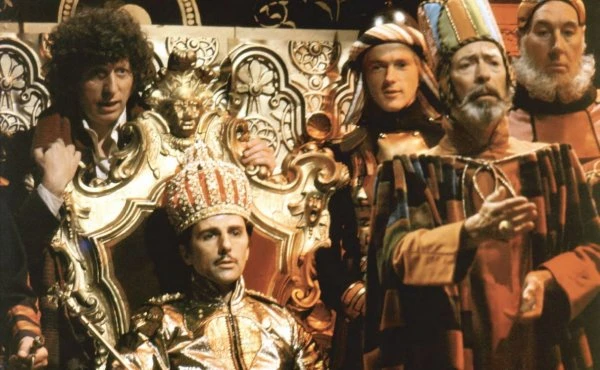
The story is fairly slim, with lots of captures and escapes as the Count tries to connive his way onto the throne. This involves having Strella, or a duplicate thereof, marrying Reynart after his coronation, becoming queen, then Grendel marrying her after the Prince meets an unfortunate accident. Then, lo and behold, Strella will meet a similarly unlucky fate and Grendel will inherit the throne. It's all an excuse for lots of running about, breaking in and out of castles and dungeons and courtly intrigue. It's absolutely made by Peter Jeffrey (One by One, By the Sword Divided) who gives a wonderfully melodramatic and thoroughly charismatic performance as Count Grendel. The remaining cast all do well, but they can't hope to make the same impression when stuck between Jeffrey and Baker fighting for dominance. Neville Jason (Skorpion) is charmingly stiff-upper-lipped as Prince Reynart, with Simon Lack (Telford's Change, Enemy at the Door) is memorable as his gruff swordsman Zadek. Lois Baxter (When the Boat Comes In, Coronation Street) gives a strong, subtle performance as Lamia, Grendel's android engineer and cast-off lover, and is frankly better than the material needs.
If there's an issue with the story, it's that it's a little slow, while this kind of adventure benefits from a frenetic pace. Nonetheless, the derring-do is tremendous fun, with Baker's Doctor remarkably at home in this Ruritanian adventure. The serial culminates in an epic swordfight between the Doctor and Grendel, with the defeated count leaping from the battlements with the epic final line: “Next time, I shall not be so lenient!” If ever a villain needed to return, somehow, it was him.
After a run of four entertaining serials, the season begins to fall apart with The Power of Kroll. Suffering from a dearth of useable scripts, Williams and Read called upon Robert Holmes to deliver a second story as well. Unlike the season opener The Ribos Operation, the fifth serial doesn't play to any of Holmes's strengths, as he was ordered to keep the humour to a minimum and had little time to write the thing. As such, he rushed out a script full of clichés which is both written and performed dead straight, with the exception of scenes where the Doctor is on hand to lighten things up with a little facetiousness. Further behind-the-scenes difficulties saw several actors drop out shortly before filming, necessitating short notice recasting. Meanwhile, Williams went on sick leave, putting production unit manager John Nathan-Turner in charge. He, at least, made a good impression, inheriting the role of producer from Williams in 1980.
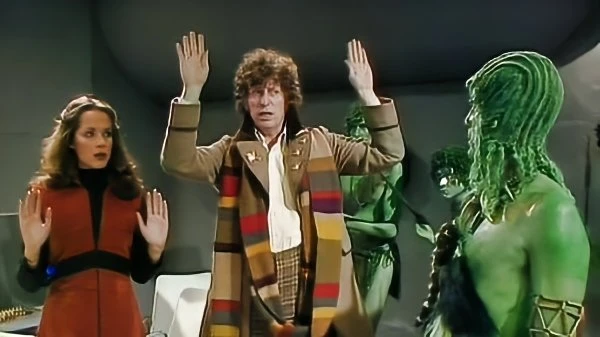
The Power of Kroll is set on the Third Moon of Delta Magna, a swampy environment populated by aliens called, um, Swampies. They were kicked off Delta Magna itself when humans arrived centuries earlier, and now they're threatened again as a methane refinery has been set up in their damp backyard. There's are serious themes here, including the forcible relocation of native populations; racist dismissal of less technological cultures as primitive; relentless exploitation of natural resources; and corporate greed as a major influence on society's development. Unfortunately, it's all rather undercut by the decision to make the natives a bunch of white men painted green with green dreadlock wigs, spouting absurd nonsense of the sort that western people imagine makes up tribal religion. The result is a story that is trying to be a polemic against colonialism but ends up weirdly racist, even though it's not about any real world people.
The cast do their best. Tamm is getting better all the time as Romana, who's characterised well here, and it's clear that the character is at her best when she's cutting arrogant men down to size. K-9 doesn't appear at all, since a robot dog is unsuited do knee-deep water in both fiction and reality, but John Leeson gets to appear in the flesh for once as refinery worker Dugeen. Sadly, it's a pretty unmemorable role. Neil McCarthy (Freewheelers) is suitably unlikeable as corrupt refinery chief Thawn, while Philip Madoc (A Mind to Kill, Moonacre) is wasted as the somewhat moral Fenner (he was hired under the assumption he'd have a larger part, and looks visibly cheesed off throughout). John Abineri (Robin Hood, The Moon Stallion) does his best as tribal leader Ranquin, but he's hampered by the layers of green make-up and risible dialogue. They'd all been on Doctor Who several time before, and you can understand why, after this, they didn't come back.
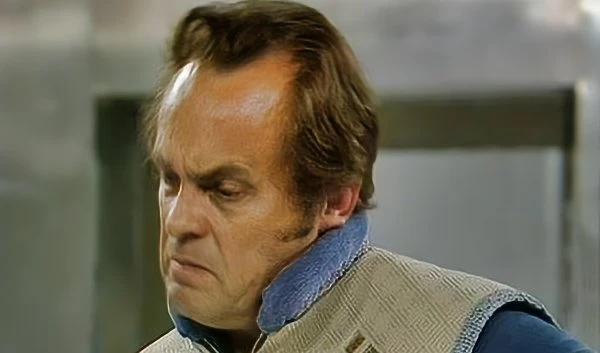
Glyn Owen (Oil Strike North, Ennal's Point) is by far the most memorable of the guest cast as the intriguingly named Rohm-Dutt, a mercenary gunrunner who's arming the Swampies ostensibly at the behest of an anti-colonialist protest group. Owen plays him as a snarling Irishman, who has a detached interest in the Swampies' sacrificial ways and the war that's building, but is mostly concerned with money.
Aside from the loss of humour, the other instruction Holmes was given was to include the biggest monster in Doctor Who history. Enter Kroll itself, a mile-wide squid with dozens of tentacles that's worshipped by a god by the Swampies. The Kroll puppet is actually very effective; however, it's let down by a very visible join between it and the live-action footage beneath as it towers over the characters. The model work is in fact top notch throughout and the location work at Iken Marsh makes for a very different visual setting, although it can't have been pleasant to film in. It's the combination of the two that doesn't quite work. Still, there are some fun elements at play, as with the first cliffhanger, which sees Romana menaced by a very unconvincing squid monster... which turns out to be a native man in a costume. As for the Key segment... it's inside Kroll's stomach, although this poses less of a problem than you might think.
Finally, we come to the six-part finale serial of the season, The Armageddon Factor. This is the last script by the writing duo Bob Baker and Dave Martin, two of the more prolific writers of seventies Doctor Who, who together had previously written seven scripts for Tom Baker and Jon Pertwee. Bob Baker would be back the following year with Nightmare of Eden, but this was Martin's final contribution to the series. The pair had become known for delivering scripts overflowing with ideas, and so were a potentially good match for Douglas Adams, who took over as script editor partway through the writing of the serial (albeit uncredited).
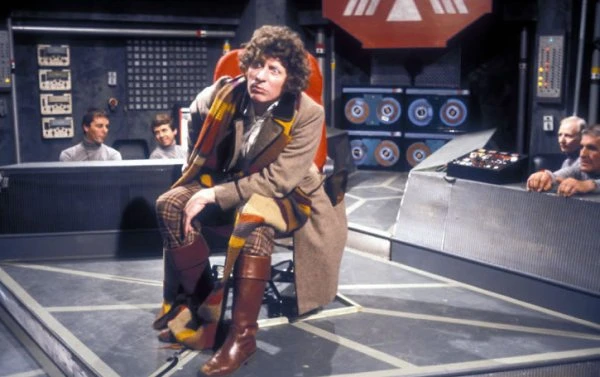
There's certainly no dearth of ideas in The Armageddon Factor. The TARDIS arrives on the planet Atrios, distant in both time and space, locked for centuries in a war with its sister planet Zeos. The serial starts with a cringeworthy patriotic scene... which then pulls away so that we see it's nothing more than propaganda, and no one's watching it anyway. Atrios has been reduced to ruins, its society given over completely to the war. John Woodvine (Finney, New Scotland Yard – and the 1984 version of The Prisoner of Zenda, coincidentally) plays the Marshal, the suitably blimpish supreme commander of the Atrian forces. He struts around dressed like General Pinochet on a particularly special occasion, and spends much of his time in a trance, communing with something hidden behind a mirror.
Not everyone is happy with the state of affairs. The planet's nominal ruler, Princess Astra seeks to broker peace, as does her lover, the young surgeon Merak (Ian Saynor – Hidden, Doom Castle). Astra is played by a pretty young actress named Lalla Ward (The Duchess of Duke Street, The Upper Crust), who would go on to have a much bigger role in Doctor Who than expected. Mary Tamm, dissatisfied with the role of Romana, declined to return for season seventeen. Ward would take over, but while she's not bad as the Princess, she doesn't get to do much but be frosty and stalwart here, with little of the charm she'd later show as the Time Lady. Still, she did get on very well with Tom Baker, which is more than could be said for most of the cast and crew at this time.
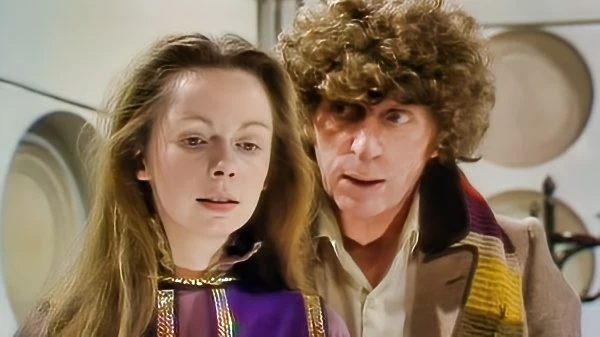
The sixth segment of the Key is somewhere on Atrios, but unfortunately for the Doctor, the Black Guardian has sent his own agent to find it. The Shadow, a skull-faced villain played hissingly by William Squire (Black Arrow, Callan) has been waiting on his own dank little planet between Atrios and Zeos for thousands of years, sure in the knowledge that the Doctor will arrive with the other five segments and he can take them for himself. However, in all this time, he's never bothered to find out what the segment is disguised as. Patience and looking spooky are high on the Shadow's skill list, but reasoning and forethought are somewhat further down.
Plenty happens across these episodes, and there are some charming ideas. The Shadow taking the Doctor prisoner and threatening to keep him there for years until he gets bored enough to surrender the Key. Astra is kidnapped, seemingly to Zeos, and a mission there reveals that the Zeons have been dead for decades; their battle computer is all that remains, continuing its imperative to secure victory over the Atrians. (Grimly amusing, this sounds like an Adams invention, but was apparently down to Read before he left the series.) K-9 at least get to enjoy a chat with a fellow computer, and he gets plenty to do this story, unsurprisingly given that Baker and Martin created him and would go on to try to spin him off into his own adventures for years afterwards.
Then there's Drax. Barry Jackson (Midsomer Murders, Horace) plays the Time Lord dropout, who was at school with the Doctor but failed his exams, went into the fix-up business and drifted to the wrong side of the law. After getting stuck on Earth, he ended up in Brixton for ten years, leaving him a cockney accent and a dodgy dialect. The idea of a cockney wideboy Time Lord is as irresistible as it is ridiculous, and with Jackson hamming it up just enough it's hard not to love him. More baffling is his insistence on calling the Doctor Thete – short for Theta Sigma, which is presented as if it's actually the Doctor's name. Fans decided this was far too ridiculous and along the line it was written off in-universe as being nothing more than an academy nickname, but it really seems that Baker and Martin thought they'd revealed the Doctor's name after all these years. Plus, with Drax's accent, it sounds more like the Doctor's name is Feet. Which, coincidentally, is what Drax and the Doctor end up looking at for half of the last episode, when Drax accidentally shrinks them to an inch high in a blatant bit of padding.
For a story that effectively had four writers work on it, is full of incident and is intended as the climax of a season-long quest, you might expect something special. Michael Hayes directs, and he does a decent job, yet for all that happens, The Armageddon Factor is deathly slow. Even with new twists each episode, there isn't enough to fill all six parts. The worst offender in this regard is the Doctor's attempt to bodge the Key to Time with a fake sixth segment, which gives him the ability to manipulate time across the universe, for an hour or so anyway. With the Marshall ready to launch an attack that will destroy the entire star system, he sticks the universe in a five-second time loop. It's another clever idea but presents as the same few seconds of footage being repeated over and over and over, across the better part of three episodes, cutting away from the Doctor and co every time it threatens to get too interesting.
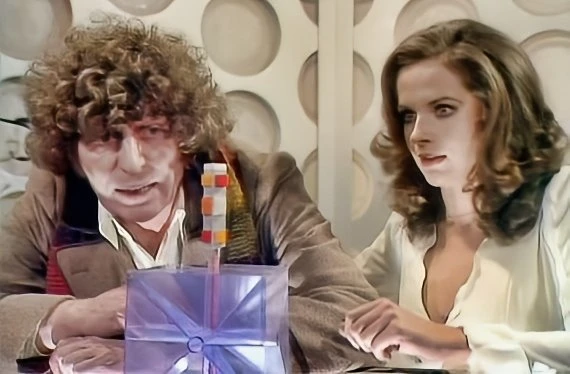
Yet the final episode somehow manages to be rushed. It does, however, contain some of the story's most intriguing ideas, not least of which is the reveal of the final segment's form: the Princess Astra herself (almost certainly Adams's idea, as a segment becoming a person was another possibility floated for his script The Pirate Planet). While there is some time spent on the unpleasant repercussions of this, she sacrifices herself with barely a second thought and it's onto the final resolution of the serial, and the entire season. The Black Guardian, played by Valentine Dyall (The Man in Black himself), arrives to take the Key, switching his form to that of the White in order to fool the Doctor. There's a suggestion that the White and Black Guardians are one and the same, merely aspects of the same being; however, this is pretty much lost amongst Dyall's snarling vengeance at the Doctor when he decides no one should have the Key at all. Snapping the tracer and dispersing the Key back throughout the universe, it's a thematically sound ending but one that renders the entire story arc a bit of a waste of effort. Still, it was a lot of fun along the way, at least for about two thirds of it.


